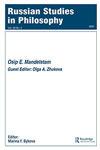“For the World’s Complexity”: Intellectual “Condensing of Reality” in O. Mandelstam’s Works
IF 0.1
4区 哲学
Q4 Arts and Humanities
引用次数: 0
Abstract
ABSTRACT This article focuses on the theoretical foundations of Osip Mandelstam’s semantic poetics, its cultural–philosophical richness, and its aesthetic novelty. The principal features of Mandelstam’s poetic world are its metaphorical and associative complexity and persistent struggle with metaphysical “emptiness.” Guided by Yu. Tynianov’s law that verse structure should be tight and unified, the poet achieves an exceptional “condensing” of his poetic texts, using this for his particular creative strategies aimed at enhancing the polysemy of the word, expanding its cultural–historical context, achieving semantic uncertainty, and combining philosophical “connectedness” with associative “disconnectedness.” These strategies include a reliance on semantic clusters, which involve “bunches” of contradictory meanings, chains of binary and ternary deep structures of text, and a dramatic combination of binarity and ternarity. Mandelstam’s creation of a “moiré” texture in his poetic texts contributes to the deepening of their tragic outlook of confusion and hopelessness, which corresponds to the realities of the Stalin era and the impending Great Terror.“为了世界的复杂性”:曼德尔斯坦作品中的知识分子“现实的浓缩”
本文主要探讨曼德尔施塔姆语义诗学的理论基础、文化哲学的丰富性和美学的新颖性。曼德尔施塔姆诗歌世界的主要特征是其隐喻和联想的复杂性,以及与形而上的“空虚”的持续斗争。由余指导。根据泰尼亚诺夫的诗歌结构应紧密统一的原则,诗人实现了对诗歌文本的一种特殊的“浓缩”,并将其用于其独特的创作策略,旨在增强词的多义性,扩大其文化历史语境,实现语义的不确定性,并将哲学上的“联系”与联想上的“分离”结合起来。这些策略包括对语义集群的依赖,语义集群涉及矛盾意义的“束”,文本的二元和三元深层结构链,以及二元和三元的戏剧性组合。曼德尔施塔姆在他的诗歌文本中创造了一种“悲剧性”的纹理,有助于加深他们困惑和绝望的悲剧性观点,这与斯大林时代和即将到来的大恐怖的现实相对应。
本文章由计算机程序翻译,如有差异,请以英文原文为准。
求助全文
约1分钟内获得全文
求助全文
来源期刊

RUSSIAN STUDIES IN PHILOSOPHY
PHILOSOPHY-
CiteScore
0.10
自引率
0.00%
发文量
14
期刊介绍:
Russian Studies in Philosophy publishes thematic issues featuring selected scholarly papers from conferences and joint research projects as well as from the leading Russian-language journals in philosophy. Thematic coverage ranges over significant theoretical topics as well as topics in the history of philosophy, both European and Russian, including issues focused on institutions, schools, and figures such as Bakhtin, Fedorov, Leontev, Losev, Rozanov, Solovev, and Zinovev.
 求助内容:
求助内容: 应助结果提醒方式:
应助结果提醒方式:


